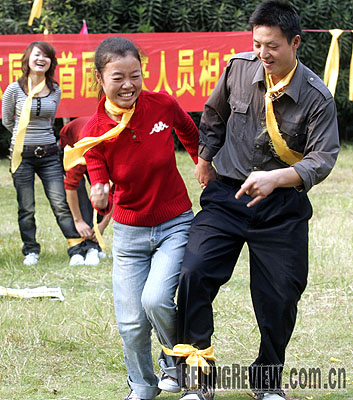|

HAPPY DAYS: Two migrant workers take part in a three legged race during a matchmaking activity
On March 8, International Working Women's Day, Gao Huiling, a female migrant worker employed in a textile company in Dongguan City, Guangdong Province, woke earlier than usual. She went to the hospital instead of work for a free physical examination, a gift from the local government for female migrant workers.
She was one of more than 10,000 female migrant workers who received free check-ups. Dongguan is a gathering place of textile companies, which have employed many female migrant workers. As early as 2004, the local government set up schools where female workers can receive technical training and health care knowledge.
The Population Development Studies Center of the Renmin University of China conducted a survey in 2007, which showed that male migrants from the countryside now dominate the construction industry across China, while rural migrant women are the backbone of the workforce in the textile and manufacturing industries.
Nanjing College for Population Program Management conducted a survey last year involving 1,007 female migrant workers who had lived in the Jianye District of Nanjing City, Jiangsu Province, for over three months. In total, 92.2 percent of the women workers lived with their husband and had a monthly income between 500 yuan ($73.2) and 1,200 yuan ($176) themselves. Most of them worked in service industries, such as cleaning, hairdressing and sales.
"Female migrant workers show little concern about physical health," said Yin Qin, a professor from the college. The result revealed that 30.8 percent of the women had been diagnosed with gynecological diseases, but only 18.3 had received treatment and the rest thought the disease is not a big deal. A total of 31.3 percent of the women did not clearly understand what AIDS is or how it is transmitted.
To deal with this situation, the Family Planning Bureau of Jianye District carried out a project called Care Card, providing free physical examination cards to 8,000 female migrant workers in the district. They also sent medical teams to the outskirts of the city to provide free consultations and treatment to women living there.
Many other places, including Guangzhou in Guangdong Province and Hefei in Anhui Province, conducted the similar projects to help female migrant workers.
Another problem that bothers female migrant workers is that most of them do not know where to turn to for legal aid when their rights are violated.
"They don't have enough legal knowledge to protect themselves," said Li Pingyuan, Director of the Justice Bureau of Yinghai Town, Daxing District, Beijing. The present laws were set up to protect all women and do not consider the special needs of migrant women workers, he said.
With this in mind, some local governments have implemented policies to improve the situation. The court and justice department of Fengtai District in Beijing set up a special legal body to hear the cases of female migrant workers, but many still face a long haul to their hometown for certificates needed in the legal process.
"Anyway, we have to at first let them know where to turn to when they have legal problems. Beijing has set up legal aid centers in every district for female migrant workers," said Li.
Lots of associations also help to protect female migrant workers. Qian Huanqi, a delegate of the 10th National Women's Congress, is the head of Jinling College in Nanjing City, Jiangsu Province. In July 2008, the college started a project called Home for New Residents, which provides free libraries, training classes and legal aid for female migrant workers. "There are more and more migrant workers in Nanjing and we have a responsibility to help them get involved in life here and to offer help as much as we can. A lot of students and teachers from the college have joined in the project and it runs pretty well."
"It is more difficult for female migrant workers to be independent. They have more obstacles and fewer opportunities. If they fail once, they might easily give up and never try again. It takes a cooperative effort by the whole society to better their living conditions," said Ma Fengzhi, a sociologist from the Institute of Sociology and Anthropology at Peking University. | 